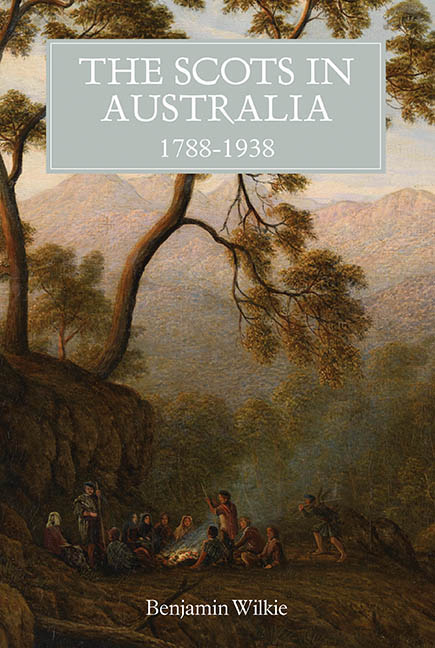Book contents
- Frontmatter
- Contents
- Illustrations
- Acknowledgements
- Abbreviations
- Introduction
- 1 From Scotland to Australia: Convicts, Free Settlers, and Encounters with Australia
- 2 Caledonia Australis: Imperial Commerce, Migrant Networks, and Australian Pastoralism
- 3 Scottish Migrants and Indigenous Australians
- 4 Imagining Home: Scottish Culture in Australia
- 5 Warriors of Empire: A Case Study of Popular Imperialism
- 6 The Empire Builders: Imperial Commerce and Migration between the Wars
- 7 New Scots: Industry, Settlement, and Working-Class Migration
- 8 At The Edge of Scotland's Diaspora: Diversity and Tension in the Twentieth Century
- Conclusion: The Imperial Legacy
- Bibliography
- Index
2 - Caledonia Australis: Imperial Commerce, Migrant Networks, and Australian Pastoralism
Published online by Cambridge University Press: 23 August 2019
- Frontmatter
- Contents
- Illustrations
- Acknowledgements
- Abbreviations
- Introduction
- 1 From Scotland to Australia: Convicts, Free Settlers, and Encounters with Australia
- 2 Caledonia Australis: Imperial Commerce, Migrant Networks, and Australian Pastoralism
- 3 Scottish Migrants and Indigenous Australians
- 4 Imagining Home: Scottish Culture in Australia
- 5 Warriors of Empire: A Case Study of Popular Imperialism
- 6 The Empire Builders: Imperial Commerce and Migration between the Wars
- 7 New Scots: Industry, Settlement, and Working-Class Migration
- 8 At The Edge of Scotland's Diaspora: Diversity and Tension in the Twentieth Century
- Conclusion: The Imperial Legacy
- Bibliography
- Index
Summary
In 1855, after travelling through Victoria for two years, the English author William Howitt reflected in his diaries on the energy expended by Scots on commercial endeavours in the colonies. ‘We give the Scotch much unbounded credit for enter¬prise and the quality which their own word ‘canny’ so well expresses’, wrote Howitt, ‘that we are not surprised to find a host of Scotchmen on whatever shore we may step, where money is to be made. Neither the snows of Canada nor the heats of India present any obstacles to them.’ At home, the commercial class of Scotland considered the British Empire a place of great potential for entrepreneurial dyna¬mism and enterprise. Indeed, central to Scotland's imperial mission was the pres¬ence of Scottish business within the apparatus of Empire.
The imperial hunger for new lands, resources, and markets would extend, even¬tually, to the Australian colonies, and with the migration of thousands of indi¬viduals over the nineteenth century Scotland made a significant contribution to the European colonisation of the continent. In conjunction with the export of its people, Scotland's commercial connections also spread into the Antipodean colo¬nies with a substantial investment of capital and labour in the nascent Australian pastoral industry. Scottish commerce in colonial Australia operated at various scales – from large investment companies and the extensive mercantile class, to intricate social and familial networks – and formed the vital commercial arm of Scotland's imperial endeavours. Scots and Scottish money were in the vanguard of Australia's nineteenth-century pastoral industry, which dramatically remade the landscape – culturally and physically – and had far-reaching consequences for both the new arrivals and Australia's First Peoples. As Mairi Stewart and Fiona Watson have written, during the nineteenth century in Scotland ‘there developed an over¬whelming imperative to dominate nature … Increasingly, nature became a focus for “improvement”, and in time, across the land it is likely that change was realised to a far greater extent than had ever been known before in terms of human impact.’ The drive for agricultural improvement proceeded apace in Australia.
Scotland's Commercial Empire
Australia offered Scots a regional platform for extending their commercial interests in the southern hemisphere and further throughout the Empire. Scots were already disproportionately represented in the lucrative commercial empire of the East India Company (EIC).
- Type
- Chapter
- Information
- The Scots in Australia, 1788–1938 , pp. 31 - 50Publisher: Boydell & BrewerPrint publication year: 2017

